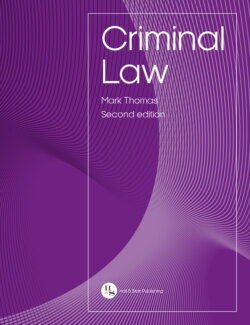Читать книгу Criminal Law - Mark Thomas - Страница 63
На сайте Литреса книга снята с продажи.
2.3.1Conduct crimes
ОглавлениеConduct crimes are offences where the defendant’s conduct is prohibited (unlawful) regardless of the end result. Another way of explaining this is to say that the consequences, if any, of the defendant’s behaviour are irrelevant to his liability. Examples of conduct crimes include:
•perjury;
•theft; and
•rape.
As stated above, there is no need to prove causation when considering a conduct crime given that the end result brought about by the defendant is irrelevant to his liability. For example, in a case of theft, it is irrelevant in theory as to whether an individual has actually managed to steal an item from a supermarket. All that is required is that he appropriates such property with the dishonest intention to steal. In practice, of course, the police are unlikely to arrest and the CPS unlikely to charge an individual unless the item was actually stolen; however, there need be no proof of such causation when considering conduct-only crimes.
By way of a second example, consider the offence of perjury, contrary to s 1(1) of the Perjury Act 1911. Section 1(1) provides:
If any person lawfully sworn as a witness or as an interpreter in a judicial proceeding wilfully makes a statement material in that proceeding, which he knows to be false or does not believe to be true, he shall be guilty of perjury. (emphasis added)
It is irrelevant whether the evidence actually turns out to be true, so long as the defendant believes it to be untrue. This is because the end result (ie whether the statement is actually untrue) is irrelevant; the conduct (ie the making of the statement) is the essential ingredient for the offence.
